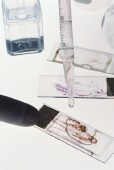 |
 |
 |
||
    |
||||
|
||||

Protein-Folding Problem May Help Spur Alzheimer's
Finding could lead to new target for disease therapy, researchers say|
|
HealthDay
By Robert Preidt
Wednesday, April 1, 2009
 WEDNESDAY, April 1 (HealthDay News) -- A dysfunction in protein folding contributes to nerve cell death in Alzheimer's disease, a finding that could help lead to new treatments, Dutch researchers report.
WEDNESDAY, April 1 (HealthDay News) -- A dysfunction in protein folding contributes to nerve cell death in Alzheimer's disease, a finding that could help lead to new treatments, Dutch researchers report.
The presence of tangles of misfolded proteins is believed to contribute to Alzheimer's disease, the experts explained. A process known as the "unfolded protein response" typically protects cells from the toxic effects of accumulated misfolded proteins. But prolonged activation of the unfolded protein response -- such as that seen in Alzheimer's patients -- may result in cell death.
The researchers at the VU University Medical Center in Amsterdam and the University of Amsterdam believed that unfolded protein response contributed to brain damage through its effects on the accumulation of hyperphosphorylated tau, a major component of tangles in the brains of people with Alzheimer's.
The study revealed that markers of the unfolded protein response were expressed in areas of tau accumulation in Alzheimer's patients. The unfolded protein response-related proteins were expressed early, in pre-tangle neurons, but were absent in tangle neurons.
The findings suggest that "unfolded protein response activation occurs at an early stage of neurofibrillary degeneration and ... that the prolonged activation of the [unfolded protein response] is involved in both tau phosphorylation and neurodegeneration in [Alzheimer's disease] pathogenesis ... Future studies will address the therapeutic opportunities of this pathway for the treatment of [Alzheimer's disease] and other tauopathies," the researchers wrote.
The study was published in the April issue of The American Journal of Pathology.
HealthDay
Copyright (c) 2009 ScoutNews, LLC. All rights reserved.
Related News:
More News on this Date
Related MedlinePlus Pages:
| Home | Health Topics | Drugs & Supplements | Encyclopedia | Dictionary | News | Directories | Other Resources | |
| Disclaimers | Copyright | Privacy | Accessibility | Quality Guidelines U.S. National Library of Medicine, 8600 Rockville Pike, Bethesda, MD 20894 National Institutes of Health | Department of Health & Human Services |
Date last updated: 02 April 2009 |
